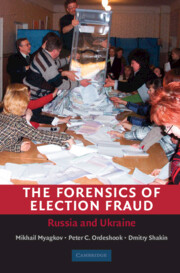Crossref Citations
This Book has been
cited by the following publications. This list is generated based on data provided by Crossref.
Hyde, Susan D.
and
Marinov, Nikolay
2008.
Does Information Facilitate Self-Enforcing Democracy? The Role of International Election Monitoring.
SSRN Electronic Journal,
Rose, Richard
and
Mishler, William
2009.
How Do Electors Respond to an "Unfair" Election? The Experience of Russians.
Post-Soviet Affairs,
Vol. 25,
Issue. 2,
p.
118.
Malesky, Edmund J.
and
Schuler, Paul J.
2010.
The Single-Party Dictator’s Dilemma Information in Elections Without Opposition.
SSRN Electronic Journal,
Gans-Morse, Jordan
Mazzuca, Sebastian
and
Nichter, Simeon
2010.
Varieties of Clientelism: Machine Politics During Elections.
SSRN Electronic Journal,
Franke, Anja
Gawrich, Andrea
Melnykovska, Inna
and
Schweickert, Rainer
2010.
The European Union's Relations with Ukraine and Azerbaijan.
Post-Soviet Affairs,
Vol. 26,
Issue. 2,
p.
149.
Lukinova, Evgeniya
Myagkov, Mikhail
and
Ordeshook, Peter C.
2011.
Metastasised Fraud in Russia's 2008 Presidential Election.
Europe-Asia Studies,
Vol. 63,
Issue. 4,
p.
603.
Kalinin, Kirill
and
Mebane, Walter R.
2011.
Understanding Electoral Frauds Through Evolution of Russian Federalism: From ‘Bargaining Loyalty’ to ‘Signaling Loyalty’.
SSRN Electronic Journal,
MALESKY, EDMUND
and
SCHULER, PAUL
2011.
The Single‐Party Dictator's Dilemma: Information in Elections without Opposition.
Legislative Studies Quarterly,
Vol. 36,
Issue. 4,
p.
491.
White, Stephen
2011.
Elections Russian-Style.
Europe-Asia Studies,
Vol. 63,
Issue. 4,
p.
531.
Mebane, Walter R.
2011.
Comment on “Benford's Law and the Detection of Election Fraud”.
Political Analysis,
Vol. 19,
Issue. 3,
p.
269.
McAllister, Ian
and
White, Stephen
2011.
Public Perceptions of Electoral Fairness in Russia.
Europe-Asia Studies,
Vol. 63,
Issue. 4,
p.
663.
Vorobyev, Dmitriy
2011.
Towards Detecting and Measuring Ballot Stuffing.
SSRN Electronic Journal,
2011.
Understanding Russian Politics.
p.
371.
Lukinova, Evgeniya
Myagkov, Mikhail
and
Ordeshook, Peter C.
2011.
Ukraine 2010: Were Tymoshenko's Cries of Fraud Anything More Than Smoke?.
Post-Soviet Affairs,
Vol. 27,
Issue. 1,
p.
37.
White, Stephen
and
Feklyunina, Valentina
2011.
Russia's Authoritarian Elections: The View from Below.
Europe-Asia Studies,
Vol. 63,
Issue. 4,
p.
579.
Birch, Sarah
2011.
Post-Soviet Electoral Practices in Comparative Perspective.
Europe-Asia Studies,
Vol. 63,
Issue. 4,
p.
703.
Deckert, Joseph
Myagkov, Mikhail
and
Ordeshook, Peter C.
2011.
Benford's Law and the Detection of Election Fraud.
Political Analysis,
Vol. 19,
Issue. 3,
p.
245.
2011.
Understanding Russian Politics.
p.
27.
FUKUMOTO, KENTARO
and
HORIUCHI, YUSAKU
2011.
Making Outsiders' Votes Count: Detecting Electoral Fraud through a Natural Experiment.
American Political Science Review,
Vol. 105,
Issue. 3,
p.
586.
Maley, William
2011.
Challenges of Political Development in Afghanistan: Mass, Elite and Institutional Dimensions.
International Studies,
Vol. 48,
Issue. 1,
p.
21.



